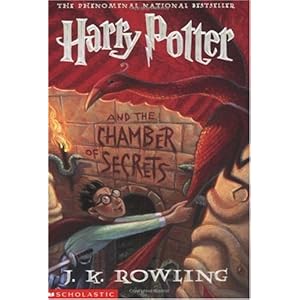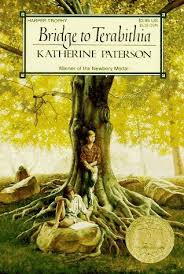Tuesday, January 11, 2011
Rudyard Kipling in Retrospect:
Sunday, January 9, 2011
Great Literary MacGuffins, Part Two: More Great Examples
 One of the best Harry Potter books of the series, and it's not hard to see why. The Chamber of Secrets becomes the Literary MacGuffin as the Heir to Slytherin uses it to petrify Muggle-born students, a ghost and a cat. Harry, already suspected of being the Heir, investigates the real attacker's identity while fending off a house elf's attempts to "save his life." I love how the American cover illustrates the climatic scene, where Fawkes carries Harry, Ginny, Ron and Lockhart out of the Chamber, because it's vivid and colorful. Chamber of Secrets may not be warm and fuzzy, but it needed a happy cover.
One of the best Harry Potter books of the series, and it's not hard to see why. The Chamber of Secrets becomes the Literary MacGuffin as the Heir to Slytherin uses it to petrify Muggle-born students, a ghost and a cat. Harry, already suspected of being the Heir, investigates the real attacker's identity while fending off a house elf's attempts to "save his life." I love how the American cover illustrates the climatic scene, where Fawkes carries Harry, Ginny, Ron and Lockhart out of the Chamber, because it's vivid and colorful. Chamber of Secrets may not be warm and fuzzy, but it needed a happy cover.
PLEASE Don't Censor Mark Twain!
Sunday, January 2, 2011
Righteous Fury: Short Comment on the UCF cheating
For a bit of context, a business professor accused 200 of his students of cheating on an exam . The students retaliated by posting the lecture on YouTube with their subtitles and a defense: Professor Quinn had used the textbook publisher's exam as his template, and the students had not known they were cheating. The debate has exploded on national television, with some of the major new outlets siding with Professor Quinn.
I side with the students on this issue, though I understand Professor Quinn's frustration. Education may be a privilege, but you have to rear it like a child: sometimes it refuses to comply to your need for a GPA above 3 points. Most of us work our butts off to pass our classes while trying to learn the subject matter. I preferred to learn, but grades measure our learning. And then someone CHEATS and surpasses all the hard-workers, including the professors who once had to work their butts off? No wonder the administration hates students who take the shortcut.
All the good teachers I've had in school believe in elbow grease. An art professor who gave me a B (and fairly enough because I didn't put in my best effort) warned us that he knew when students didn't hand in their own work. My high school economic teacher was head of the Honor Council AND the Social Studies department; she made us work hard, but we all got high scores on the AP Economics exam.
Something else all my good teachers believed in: courtesy. If they lost their tempers, we accepted it in grace and tried to learn from it. If we disagreed with them, we were allowed to bring it up in class, and we allowed them to shoot us down or apologize when we were right. I did a three-part blog post about the importance of courtesy when writing; ideally, we would apply that same courtesy to real life.
As several news outlets have noted, technology has stretched into grey areas where "cheating" and "information exchange" are concerned; students got furious when they perceived Professor Quinn as a hypocrite, since he hadn't made up his own exam. But could they have handled it better? Let's see . . .
Posting a YouTube video of the infamous lecture with subtitles of the students' counter-argument? Effective, but the video was filled with typos. Normally I wouldn't care, but writers never get published if their work is filled with typos and grammatical errors, and I'm a stickler about this sort of things. The students had made their point, but missing apostrophes don't help your cause.
An article in the student newspaper about "confronting" Professor Quinn, with students in the comments calling him "lazy"? I understand your point, but your enemy isn't a serial killer with a chainsaw and a hook.
Source: http://t1.gstatic.com/images?q=tbn:ANd9GcS2-SD3boMVvtylbCnssvMEWwkioaabbk-r6vztC29-QwRlY0MZOg
Treat him objectively, and let him give his side of the story. Asking him loaded questions will support your view, but it won't give you the truth, or even his version of the truth.
But Professor Quinn is also at fault. While offering clemency to the accused, he not only forced every student to retake the exam, including the 400 who "did not cheat" but also refused to comment for student press. Professor Quinn has, in a nutshell, burned his bridges with the students as well as the student body by not offering his opinion to the newspaper or being gracious in the face of pressure. Teachers make mistakes, and they're not politicians; any administration that fires someone over a misunderstanding is a narrow-minded administration.
I'm also disappointed with Quinn's supporters; they claim that moral standards have lapsed in the twenty-first century. First off, while everyone doesn't cheat, there will always be people in the world searching for dirty shortcuts. College students have NOT become miscreants, and it's not fair to accuse the hard working of moral lapses. Lapses in work ethic, yes, especially in the age of consumerism. Lapses in working under pressure, yes. But lapses in MORALITY? Not only does that hurt, but we're the generation that has to handle potential ecological damage and political incompetence. I may not be planning to build efficient solar energy, but I know that I will do SOMETHING. I may have a heart turning into stone, but I have values.
I will treat you with courtesy because I believe in being nice, but do not think I am a selfish waif because of my age, or the technological era I belong to. I am not representative of my generation, and my generation does not represent me. I do not cheat. I procrastinate, yes, I may drink coffee and eat peanut butter when stressed, I may enjoy writing horror stories, I may text my friends, but I do not plagiarize. I cite my sources.
I am a writer. I am an artist. And I am a college student.